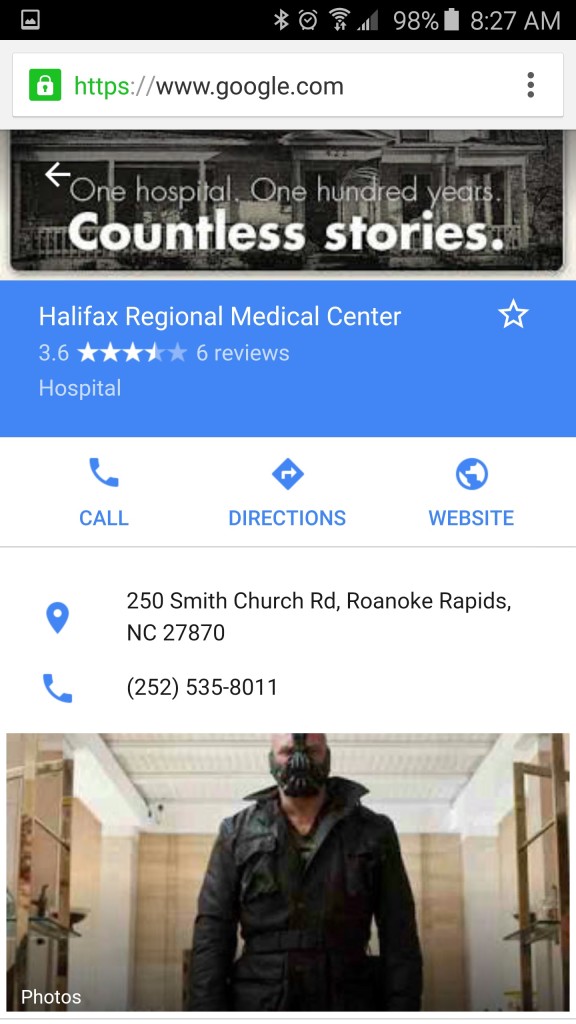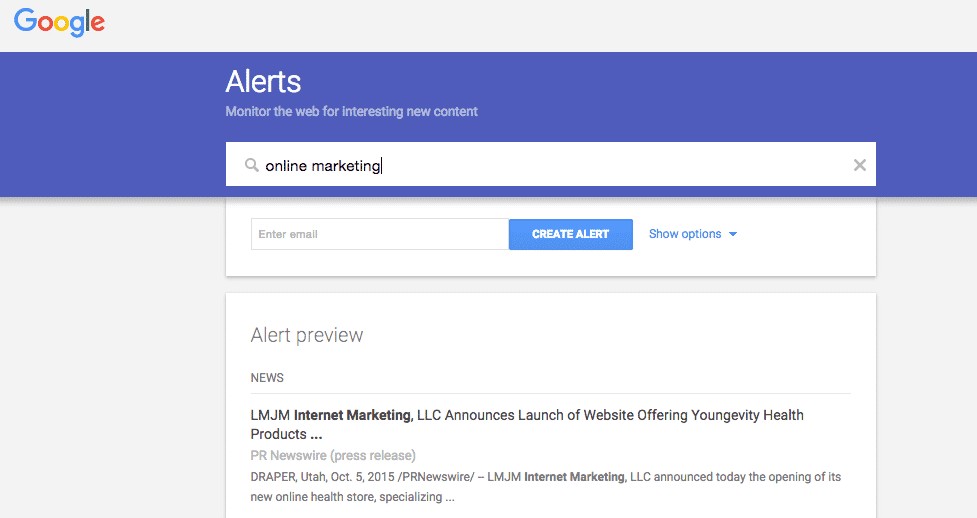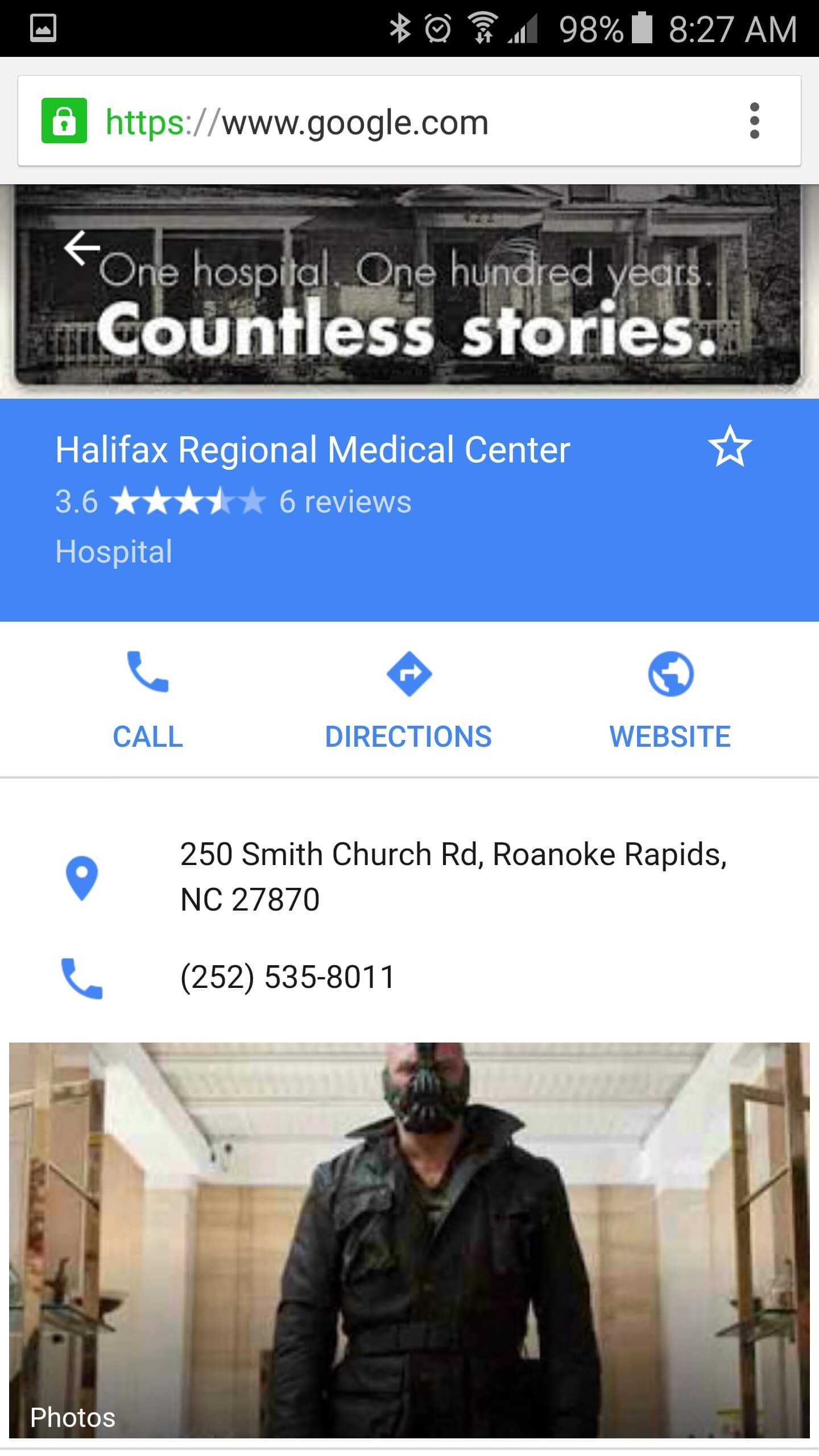Why is Online Reputation Management Important?
Part of building brand awareness and improving credibility means monitoring what others are saying about you and your business.
Online reputation monitoring allows you to respond to negative and positive comments in a timely manner, and it gives you an opportunity to improve your products and/or service based on feedback from current and past customers.
What Happens When You Don’t Monitor Your Online Reputation

In the above example, Halifax Regional Medical Center has received several reviews over the last four years or so. However, if you look more closely, it appears as though no one from the hospital is monitoring this social media outlet. Had they been monitoring it, they would’ve seen the image of Bane from the movie, The Dark Knight Rises.
Not only is the image of Bane present; it is the second listed photo in their account! It implies that the hospital is an evil-doer from the likes of the Batman movie franchise. While this is very comical, it is also very serious, and it is also a ludicrous oversight on the hospital’s management of their image and their reputation.
Responding to people’s remarks about your business/brand says a lot about you. It gives you a chance to demonstrate to others your high (or low) level of customer service. It can also serve to reinforce your business’ reputation while building credibility.
Left alone, however, the lack of response on the business’ part seems ineffectual and negligent. The business also misses the opportunity to glean useful insight from customer feedback.
Never pretend that your customers don’t exist. Be deliberate and thoughtful when forming a response to someone as everything is public. Remember, it only takes a second to capture a screen shot.
8 Tips to Monitor Your Online Reputation Better
#1 – Keep an eye on competitors.
How is your competition engaging in online reputation management and monitoring? What methods of online reputation management are you currently employing?
#2 – Monitor mentions.
Monitor any mentions of your brand, business, employees, etc. Do this on a daily basis, and be prepared to respond quickly. When it comes to online reputation, timing is everything. You don’t want to respond to someone’s negative comment about your business only to find out that the comment is more than a week old.
#3 – Monitor key influencers.
Who are the key influencers in your industry? Follow them, and keep an eye on the sort of content, comments, and questions they post. How do they react to negative press? Seeing how your influencers handle themselves on the Web can lend useful tips to you and the reputation management of your business.
#4 – Set up alerts.
Setting up alerts is quick and easy, and it’s a great way to automatically stay on top of any mentions of you on the Web. Using Google Alerts, you can set up multiple alerts for various topics, keyword phrases, and more. When monitoring your reputation online, always be sure to set up a Google Alert for: your name as well as your business’ name.
#5 – Secure your website.
Most hacking is done via automated scripts written to search the Internet for websites that have security weaknesses. It can also wreak havoc on your business and online reputation. Ways to protect yourself against hackers include:
- Keep your software up to date
- Do not allow users to upload files directly to your website
- Speak to your programmer about enacting a Secure Sockets Layer (SSL)to create a more secure connection
- And more
#6 – Perform a daily check of Google+.
Get in the habit of checking your online social media outlets for any new notifications or news. Begin with Google + by simply clicking once on the notifications tab. From there, you can scan down to see what each of the notifications is, who said it, and whether or not something warrants a response from you. You can also check your “ripples” to identify people in your fan base and geographical reach.
#7 – Perform a daily check of Facebook.
Checking Facebook should be a no-brainer. With nearly 1.5 billion users, Facebook is the most popular social networking site out there. You can alter your settings to have Facebook send you updates whenever someone leaves a comment, likes, or shares something on your Facebook page.
#8 – Perform a daily check of LinkedIn.
Over the years, LinkedIn has become a credible go-to source for business professionals. It is also a great place to network. Use this space to post relevant updates as well as build your online reputation. Log in daily to see what notifications or personal messages you’ve received. You can also see who has been commenting on your articles as well as sharing information about you.
5 Online Reputation Management Tools We Love

Google Alerts
As mentioned earlier, Google Alerts is simple to set up, and it allows you to you monitor the Web for interesting content related to a specific topic (or range of topics). For example, set up alerts about your brand or business, and Google Alerts will send you an email each time your brand or business is mentioned. You can also adjust the frequency of your alerts by having an email sent to you once per week, or once per day (versus as it happens).
TweetDeck
TweetDeck is a Twitter app platform that allows you to manage multiple Twitter accounts at once. View tweets in real time as well, and track specific searches, create lists of influencers as well as more. As far as online reputation management goes, we recommend creating searches to allow you to do real-time tracking related to what others are saying about you and your brand.
Hootsuite
Hootsuite is a social media management system that allows you to manage multiple social media accounts from a single dashboard. You can integrate it to allow multiple users access (ex: Your social media team is collaborating to manage a client’s account). There is a paid and a free version available, along with independent analytics that you can use to measure brand growth.
Topsy
Topsy is a real-time search engine, geared specifically towards socially shared content. It’s a useful social monitoring tool as it allows you to search every tweet, dating back to forever, for statistical information about you and/or your brand.
Social Mention
Social Mention is essentially a social media search platform that allows you to quickly and easily track who is saying what about you in real-time. As mentioned by the website, Social Mention monitors more than 100 social media sources, including the big names: Facebook, Twitter, YouTube, Google, and more.
FURTHER READING:
- Entrepreneur | http://www.entrepreneur.com/article/237144
- Forbes | http://onforb.es/1baOomJ
- Harvard Business Review | https://hbr.org/2007/02/reputation-and-its-risks


 It’s 2015. You already know that having website is important, but how do you know whether it’s time to get a new website? This question is best answered by looking at several criteria, which we have outlined below.
It’s 2015. You already know that having website is important, but how do you know whether it’s time to get a new website? This question is best answered by looking at several criteria, which we have outlined below.